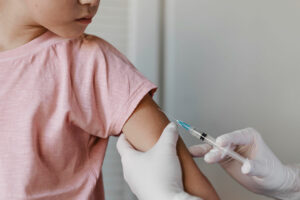Vaccinating school-age children to prevent outbreaks
With the opening of classes in the country last month coinciding with the start of the rainy season, there is a higher risk of respiratory and other vaccine-preventable diseases in school environments where children are in close contact. During a recent Health Connect media forum entitled “Kickstarting a Healthy School Year with Vaccination,” immunization experts […]

With the opening of classes in the country last month coinciding with the start of the rainy season, there is a higher risk of respiratory and other vaccine-preventable diseases in school environments where children are in close contact.
During a recent Health Connect media forum entitled “Kickstarting a Healthy School Year with Vaccination,” immunization experts underscored the importance of vaccinating school-age children to prevent outbreaks of vaccine-preventable diseases, protect families and vulnerable populations, reduce absenteeism, promote community health, ensure educational continuity, and provide long-term health benefits.
Launched at the height of the COVID-19 pandemic in 2020, Health Connect aims to serve as a platform for medical experts and journalists to provide the general public with accurate, up-to-date health information. The media forum is led by the Department of Health (DoH) with the support of the Philippine Medical Association (PMA), the Philippine Foundation for Vaccination (PFV), and the Pharmaceutical and Healthcare Association of the Philippines (PHAP).
Officials from the DoH Western Visayas Center for Health Development (WV CHD) presented strategies implemented by the city, province, and the Health department to address a pertussis outbreak in Iloilo City earlier this year as well as current initiatives and plans to promote the health and wellbeing of children in Iloilo Province.
Dr. Jose Martin Atienza, Western Visayas Regional Immunization Program Coordinator, said that their immunization program has achieved several milestones through the years, such as certification of elimination of maternal and neonatal tetanus in 2017 and elimination of wild polio virus in 2021. However, he noted that the region’s fully immunized child (FIC) coverage rate has plateaued in recent years due to pandemic-associated disruptions, overburdened health systems, and the added responsibility of mass COVID-19 vaccination efforts, among other factors.
On the positive side, Dr. Atienza revealed that the region’s FIC coverage increased slightly from 59.52% in 2022 to 61.36% in 2023. As of July 2024, around 14,845 children out of the target population in Iloilo Province of 39,077 have been fully immunized, representing a 37.99% FIC coverage rate. A fully immunized child is one who has received one dose of BCG (anti-tuberculosis) vaccine, three doses each of OPV (oral polio vaccine), DPT (diphtheria, pertussis, and tetanus) vaccine, and Hepatitis B vaccine, and one dose of measles vaccine at one year of age.
Dr. Atienza highlighted the DoH memorandum on the Interim Guidelines on the Resumption of School-based Immunization after the COVID-19 pandemic. The memorandum directs the DoH to coordinate with the Department of Education (DepEd) to implement a month-long supplemental immunization of school-age children in all public schools with measles-rubella (MR), tetanus-diphtheria (Td), and human papilloma virus (HPV) vaccines starting October 2024. Private schools can participate by coordinating with their local health centers.
Moving forward, DoH in Western Visayas is looking to engage with all partner stakeholders to mobilize the community and achieve the DoH National Immunization Program (NIP) FIC target coverage of 95%. This will involve local policy support, information dissemination campaigns, human resource augmentation (encoders, vaccinators, among others), activation of vaccination champions, logistics, funding, and transportation support.
Dr. Rodney Labis, chief of the Health Service Delivery Division, Iloilo Provincial Government, presented strategies to prevent disease outbreaks in schools during the rainy season. These include national and local policies, funding support and collaboration with other development partners, effective health promotion activities, functional disease surveillance, capacitated human resources for health, and availability of vaccines, logistics and medical supplies.Dr. Labis also recommended the passage of local ordinances to support program implementation and ensure sustainable funding support; integration in school programs of health promotion activities on infectious disease prevention; integration of schools in the DoH region-wide referral system; strengthening and sustaining of DoH-DepEd collaboration; hiring of adequate human resources for health in local health offices to ensure focused program implementation; and budget allocation by local government units for procurement of vaccines not provided by the DoH.
PFV executive director Dr. Lulu Bravo reiterated her call for a whole-of-government, whole-of-society approach in achieving the 95% FIC target coverage. PMA president Dr. Hector Santos, Jr. lauded the LGUs of Iloilo Province for implementing programs to improve immunization coverage among children. He also expressed their member-doctors’ continuing support for vaccination activities and information dissemination initiatives to address vaccine hesitancy across the country.
Immunization is one of the success stories of the 20th century. Vaccines eliminated most of the childhood diseases that used to cause millions of deaths, making possible a life without disabilities caused by certain communicable diseases like polio.
With every vaccine, vaccine developers and manufacturers, together with partners in the global health community, do more than improve and save lives. They enable vaccination that strengthens global health security through resilient and sustainable national immunization programs around the world.
The research-based pharmaceutical industry is one with the government and other key stakeholders in increasing our country’s immunization coverage so that children and their families are protected against vaccine-preventable diseases.
Teodoro B. Padilla is the executive director of Pharmaceutical and Healthcare Association of the Philippines, which represents the biopharmaceutical medicines and vaccines industry in the country. Its members are in the forefront of research and development efforts for COVID-19 and other diseases that affect Filipinos.














